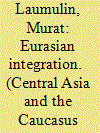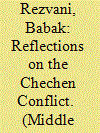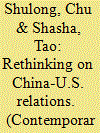|
|
|
Sort Order |
|
|
|
Items / Page
|
|
|
|
|
|
|
| Srl | Item |
| 1 |
ID:
134967


|
|
|
|
|
| Summary/Abstract |
One of the Cold War’s commonplaces about Russia was its abiding embrace of authoritarianism. Across the centuries, successive regimes, whether Tsarist or Communist, have been characterised by Western scholars as highly centralised, personalised power structures, with an intolerance of dissidence that too easily descended into barbaric brutality. Living on Europe’s farthest edge, Russia’s peoples are said to have been bypassed by Enlightenment modernity, the rise of liberal constitutionalism and the gradual entrenchment of individual rights and democratic freedoms. For those commentators inspired by such Cold War thinking, it is a legacy that continues to shape contemporary politics. The assumption is that Putin’s reclaiming of the presidency in 2012 is emblematic of an inevitable reversion to authoritarianism. Drawing on research in Russia during the March 2012 election, this article takes a critical look at the plethora of global statistical surveys that point to authoritarian trends under the current regime. It concludes that the conceptual framework underpinning the West’s revelations about the descent into authoritarianism in contemporary Russia is neither clear nor convincing.
|
|
|
|
|
|
|
|
|
|
|
|
|
|
|
|
| 2 |
ID:
134719


|
|
|
|
|
| Summary/Abstract |
Flawed electoral legislation in post-Soviet states has facilitated the conduct of undemocratic elections. This article argues that the low quality of electoral legislation in the region results in large part from a process of ‘authoritarian diffusion’, whereby the election laws of the post-Soviet states extensively borrow and adapt from Soviet laws and post-communist Russian laws. The authorities of most post-Soviet states have routinely disregarded recommendations by the Organization for Security and Co-operation in Europe and the Venice Commission to improve electoral legislation. Besides presenting evidence of ‘authoritarian diffusion’ across the post-Soviet area, the article highlights the enduring impact of the Soviet legacy and of Russia's relatively hegemonic position in the region.
|
|
|
|
|
|
|
|
|
|
|
|
|
|
|
|
| 3 |
ID:
136649


|
|
|
|
|
| Summary/Abstract |
This article addresses the question of why regional cooperation among Afghanistan’s neighbours has been so difficult despite these countries’ common concerns. To answer this question, Afghanistan is conceptualised as placed at the core of overlapping regions: South Asia, the Middle East, Central Asia and, through China’s influence, East Asia. Over the past decade, interactions among different regions ‘through’ Afghanistan have increased, and overlap has intensified. Each of these regions is characterised by more or less intense balance-of-power security dynamics, which have played out in Afghanistan. The fact that the regions that overlap in Afghanistan are predominantly characterised by patterns of conflict helps to explain the difficulties of regional cooperation
|
|
|
|
|
|
|
|
|
|
|
|
|
|
|
|
| 4 |
ID:
134559


|
|
|
|
|
| Summary/Abstract |
China is still overall a global free-rider on a system whose original creators and beneficiaries cannot now afford to maintain without help. The question that cannot now be answered is what price the West and the U.S. in particular will be prepared to pay for help.
|
|
|
|
|
|
|
|
|
|
|
|
|
|
|
|
| 5 |
ID:
135079


|
|
|
|
|
| Summary/Abstract |
Eurasian integration and the Eurasian Economic Union have attracted numerous views and opinions and ignited heated discussions: a larger part of the political and business community of the CIS countries is aware of the advantages a common economic space that has their best interests at heart will have to offer. On the other hand, the possible loss of national sovereignties and independence has stirred up apprehension that keeps politicians in two minds and slows down economic cooperation.
|
|
|
|
|
|
|
|
|
|
|
|
|
|
|
|
| 6 |
ID:
136530


|
|
|
|
|
| Summary/Abstract |
There is a history of engagement between scientists in the European Union and the Russian Federation (and, previously, the Soviet Union). This cooperation is based on the bilateral interests of governments and individual scientists alike for interaction and engagement. It also fits the EU’s broader policy goals, whereby “international cooperation in research and innovation [is seen] as an instrument of soft power and a mechanism for improving relations with key countries and regions.”1 Now, with the events in Ukraine and mutual EU and Russian sanctions, science can again—as it did during and immediately after the Cold War—play a role in sustaining dialogue and continuing fruitful and mutually beneficial connections that could help reestablish broader links. The significant scientific cooperation activities between EU member states and countries associated with its Framework Programme for Research and Technological Development, the EU’s key instrument of international science and technology (S&T) cooperation, and the Russian Federation provide a solid basis to jointly tackle common societal challenges. This paper describes an approach aimed at better understanding these challenges and determining how future scientific collaborations can most appropriately and effectively tackle them.
|
|
|
|
|
|
|
|
|
|
|
|
|
|
|
|
| 7 |
ID:
135003


|
|
|
|
|
| Summary/Abstract |
This paper explores the origins of Cossack separatism in Kuban' during 1917. It investigates the growing tension between the Cossack caste and the civic universalism of the post-February environment, a setting which increasingly made Kuban' Cossackdom an anachronism, obliging Cossacks to search for a modern alternative group identity superseding the old estate one. The Kuban' Cossacks' answer was to justify Cossacks' estate particularism for the sake of ‘civic unity’ by implementing separatism in the name of ‘self-determination’. The result was the emergence of a Cossack nation-building movement during the civil wars, which pursued the separation of a Cossack state from Bolshevik Russia.
|
|
|
|
|
|
|
|
|
|
|
|
|
|
|
|
| 8 |
ID:
136415


|
|
|
|
|
| Summary/Abstract |
The author analyzes the dynamics of Russian-American relations in the Greater Caucasus throughout the twenty-odd post-Soviet years, reveals the main development trends, and assesses the degree of confrontation and possibility of cooperation on the key regional issues in the context of the latest developments.
|
|
|
|
|
|
|
|
|
|
|
|
|
|
|
|
| 9 |
ID:
135423


|
|
|
|
|
| Summary/Abstract |
This article presents personal accounts by Russian sinologists about their professional work abroad and exchanges with foreign colleagues during the Soviet period (1917‒1991). Divided, isolated, oppressed,
discriminated, limited, and confined to their country for many decades, Russian sinologists still managed to maintain contacts with their colleagues in China, the “socialist camp,” and the global sinology community. Sinologists in the USSR had to implement various methods to penetrate the political and ideological “Iron Veil,” to promote their studies abroad, and to participate in international cooperation on China studies. This study utilizes data obtained from nearly 40 interviews conducted in Russia as part of “The Epistemology of China Studies: Oral History Project” from 2009 to 2014. Its purpose is to demonstrate the uniqueness of professional interviews as a potentially rich source and foundation for further academic explorations of oral history on China studies.
|
|
|
|
|
|
|
|
|
|
|
|
|
|
|
|
| 10 |
ID:
135097


|
|
|
|
|
| Summary/Abstract |
The author analyzes the specifics of political leadership in Georgia and what people think about them, as well as the new trends that came to the fore after the 2013 presidential election, the leadership’s resources, and the ways the political community “recruits” new members.
The author compares the prominent features of the presidencies between 1991 and 2014 to explain the subtleties of political leadership in Georgia.
He also tries to examine why the Constitution is regularly amended to redistribute legal powers between the president and prime minister.
|
|
|
|
|
|
|
|
|
|
|
|
|
|
|
|
| 11 |
ID:
134597


|
|
|
|
|
| Summary/Abstract |
This article explores the relationship between memory and place in understandings of urban change in Central Asia. Drawing on narratives of long-term residents of two Central Asian cities we investigate the ways in which positive memories of the Soviet past emerge when people speak about the urban environment of today. We explore why such fondness for the Soviet past has emerged, what elements of the past are most cherished, and which urban communities remember these elements. We ask what these forms of memory reveal about what has been lost and what this tells us about the present anxieties of urban residents.
|
|
|
|
|
|
|
|
|
|
|
|
|
|
|
|
| 12 |
ID:
134715


|
|
|
|
|
| Summary/Abstract |
The passing of the Russian NGO Law in mid-2006 set clear parameters for Russian NGO activity and civil society development. In this paper we assess the impact of the NGO Law on both NGOs and Russian civil society. Our findings illustrate that the NGO Law has led to a reduction in NGO activity and curtailment of civil society development. We conclude that Russian civil society appears to be dominated by groups funded and thus controlled by the state. This has implications for Russia's on-going democratic development.
|
|
|
|
|
|
|
|
|
|
|
|
|
|
|
|
| 13 |
ID:
136127


|
|
|
|
|
| Summary/Abstract |
The “Minsk process” has created a chance for Donbass to become a new proving ground for unrecognized statehood. Different options, ranging from Chechnya and Serbian Krajina to the Transnistrian experience, may be possible. Or the region may build a unique Donbass model.
|
|
|
|
|
|
|
|
|
|
|
|
|
|
|
|
| 14 |
ID:
135348


|
|
|
|
|
| Summary/Abstract |
The events of the so-called Arab Spring reconnected the young and their culture with images of organized political activism and resulted in huge political resonance. So this may be an appropriate point at which to reconsider the relevance of youth culture politics in the now-gone Soviet Union. The article explores the connections between cultural consumption by the young, ideology, and political ambivalence during Soviet times and considers how the Soviet genre of youth culture politics is being reproduced and continued in an extended form in the post-Soviet setting, specifically in Uzbekistan.
|
|
|
|
|
|
|
|
|
|
|
|
|
|
|
|
| 15 |
ID:
134505


|
|
|
|
|
| Summary/Abstract |
The Chechen Conflict is the most fatal and protracted conflict in the post-Soviet space. While it is the most discussed conflict there, it is also the least understood. Many contradicting accounts of it exist, and still many questions remain unanswered. One reason is that the nature of this conflict has changed over time. Unlike what many - particularly Western - analysts think, it is not a religious conflict. It began as an ethno-nationalist separatist conflict but only later was it infiltrated by extremist Salafis/Wahhabis. At this moment a war is going on between the local Chechen and the central Russian governments against the Salafi/Wahhabi Emirate of the Caucasus. Chechnya is the only autonomous region in Russia in which a separatist movement had been successful. The possible reasons are the peculiarities of the Caucasus; especially its mosaic type of ethnogeographic configuration and the traumatic past of many of its peoples. Another important factor in the explanation of such a separatist conflict in Chechnya - and nowhere else in the North Caucasus - is the fact that only in Chechnya has a titular minority enjoyed a dominant demographic position. This paper also discusses issues such as the nature of Islam in Chechnya and the Russian geopolitical codes.
|
|
|
|
|
|
|
|
|
|
|
|
|
|
|
|
| 16 |
ID:
136332


|
|
|
|
|
| Summary/Abstract |
In the quarter-century since the fall of the Berlin Wall in 1989, the former Soviet Union’s disintegration in 1991 and the end of the Cold War, China-U.S. relations have supported the trend of development. The two countries extensively and intensively have engaged in dialogue, close personnel exchanges, unprecedented economic and TRADE relations, and bilateral coordination on international and regional issues. The bilateral relationship has profound influence over the two countries and the world but, while total confrontation and crisis is not on the horizon, there is no guarantee that their future disagreements will not become serious or intractable. In this past quarter-century, the U.S. has repeatedly used and threatened to use force against China, a sign that military conflict between them, even a local or relatively large-scale war, is not out of the question. The U.S. global strategy has not changed, the basic content and goals of the U.S. strategy towards China have not changed, and the nature of the China-U.S. relationship is yet to be defined.
|
|
|
|
|
|
|
|
|
|
|
|
|
|
|
|
| 17 |
ID:
136416


|
|
|
|
|
| Summary/Abstract |
The author discusses individual aspects of Russia’s strategy in post-Soviet Central Asia and the extent to which the means and methods of geopolitical modeling can be used for analyzing the current and future political situation. He uses certain approaches and methods to identify the geopolitical models Russia applies in the region, studies the functional interactions among large powers and the regional states, and analyzes various scenarios of the region’s development determined by geopolitical conditions and the balance of power inside the region.
|
|
|
|
|
|
|
|
|
|
|
|
|
|
|
|
| 18 |
ID:
135338


|
|
|
|
|
| Summary/Abstract |
Russian interventions in South Ossetia and Crimea indicate a major shift in Moscow's policy towards the former Soviet republics. This article compares the two interventions in terms of military performance, basis of legitimacy, and motivational goals. This confirms the formation of a new and more assertive Russian policy in the region. Although there were significant differences between the two interventions, improved Russian military capabilities reveal the Kremlin's plans to project power in the near abroad. The Russian leadership used similar legal justifications for the two interventions, based on the Kosovo precedent, opening the possibility of further military action in the former Soviet space. Notwithstanding the legal excuse, Moscow mainly intervened in Georgia and Ukraine to prevent further NATO enlargement eastwards, regain geopolitical influence regionally, and respond to perceptions of insecurity and a sense of humiliation. With the possible exception of the Baltic States, the rest of the former Soviet republics could, sooner or later, fall under Russia's sway. It is a challenge that the West can choose to confront either with tougher sanctions and more involvement in the region, or by initiating a new process of socializing Russia into the international community, with security assurances and economic incentives in return for acknowledgement of Russia's role as a great power
|
|
|
|
|
|
|
|
|
|
|
|
|
|
|
|
| 19 |
ID:
136130


|
|
|
|
|
| Summary/Abstract |
Central Asian countries should be prepared for any scenario and should try to prevent the most dangerous upheavals in Afghanistan. In particular, they can strengthen their own defense capabilities and establish close cooperation with Kabul to combat regional terrorism.
|
|
|
|
|
|
|
|
|
|
|
|
|
|
|
|
| 20 |
ID:
136125


|
|
|
|
|
| Summary/Abstract |
What has been done since 2008 can probably be considered the most ambitious, consistent and effective military reform in Russia. The decisive turn from the traditional mobilizational army allowed Russia to create permanent and high readiness forces well adapted for operation in the post-Soviet region.
|
|
|
|
|
|
|
|
|
|
|
|
|
|
|
|
|
|
|
|
|